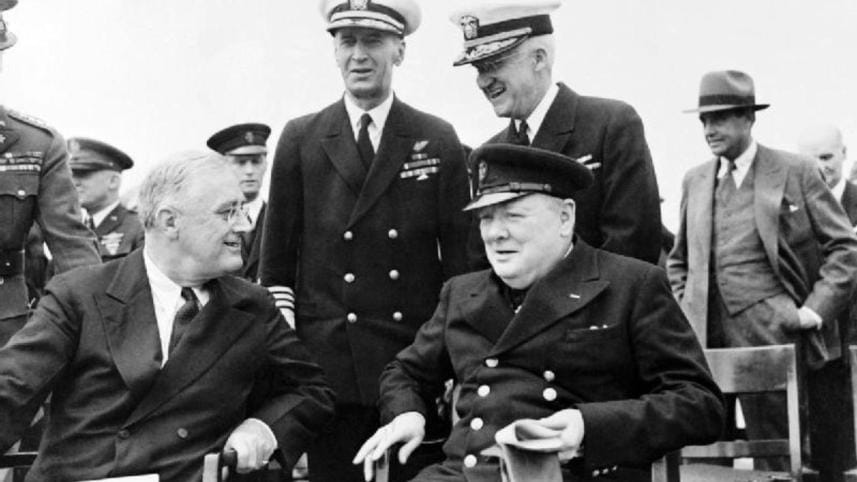Towards a new global charter

In August 1941, even before the United States had entered World War II, British Prime Minister Winston Churchill and US President Franklin D Roosevelt met secretly off the coast of Newfoundland to discuss how the world could be organised after the war. A similar feat had been attempted at Versailles just over two decades earlier, but it had clearly failed.
Churchill and FDR's assignation resulted in the Atlantic Charter, which established a set of shared principles and institutions that still define the international order eight decades later. In 1944, the Bretton Woods conference laid the groundwork for the International Monetary Fund, the World Bank, and other global financial institutions; the establishment of the United Nations soon followed. The defeated Axis powers were transformed into dynamic democracies with market economies, and were integrated into the new global system, while stability was maintained through cooperative security structures spanning the transatlantic and Pacific theatres.
Then came China's economic reforms, starting in the late 1970s, and the collapse of the Soviet Union in 1991, whereupon the dream of truly global multilateral governance as envisioned in the Atlantic Charter could start to be realised. In 1995, the Bretton Woods-era General Agreement on Tariffs and Trade was replaced with the World Trade Organization, and, in under two decades, trade as a share of global GDP has grown from around 40 percent to over 70 percent (owing in no small part to China's accession to the WTO in December 2001).
During this golden age of multilateralism, globalisation, and social and economic development, more than one billion people were lifted out of extreme poverty, and democracy became the global norm. But it is clear that the second decade of the twenty-first century has marked the advent of a different era. Memories of the international order's formative years, and of the tragedies that made it necessary, have faded with the passing of generations. New powers have emerged to challenge Western dominance within an increasingly multipolar context. And the recent proliferation of authoritarian regimes has raised questions about the future of democracy.
Though the basic structures of the post-war order remain in place, they are being hollowed out in the face of Russian revisionism, Chinese assertiveness, US disruption, and European uncertainty. With the goal of revising the principles of the Atlantic Charter for this dangerous new world, two prominent think tanks, the Atlantic Council in the US and the Center for Global Governance Innovation in Canada, recently convened policymakers and thinkers, including me, from 19 different countries.
When attempting to draft a new set of shared principles, the biggest challenge is in deciding whether to make them applicable just to the world's democracies, or also to the likes of Russia, China, and Saudi Arabia. Obviously, democracy is by far the best way to ensure that individual rights are respected; but the debate should also be open to those advocating different values and interests. In our case, we wanted to produce a document that would resonate both in the "classical West" as well as in Brazil, Algeria, Iran, India, Indonesia, and Vietnam.
Our deliberations resulted in a Declaration of Principles that we issued at the Munich Security Conference last month. "Inspired by the inalienable rights derived from our ethics, traditions, and faiths," the declaration reads, "we commit ourselves to seek a better future for our citizens and our nations. We will defend our values, overcome past failures with new ideas, answer lies with truth, confront aggression with strength, and go forward with the confidence that our principles will prevail."
The full declaration comprises seven statements under the headings of "freedom and justice," "democracy and self-determination," "peace and security," "free markets and equal opportunity," "an open and healthy planet," "the right of assistance," and "collective action." In each area, our goal was to set down principles that might serve as the tenets of a new consensus after an inclusive global debate.
The declaration is not merely a restatement of previously held beliefs. Environmental issues clearly have become more prominent than they were before, and questions of sovereignty must be reframed for an increasingly interconnected and interdependent world. Concerns about how prosperity is shared both within and between countries have gained significant currency.
But basic values such as respect for individual rights remain fundamentally important, as does the belief that "governments that answer to their citizens and respect the rule of law can best address inequity, correct injustice, and serve the good of all." Indeed, governments ignore this proviso at their peril.
As the fruit of a year's worth of discussions and revisions, the declaration has received broad support from different corners of the world. But our goal is to start a larger debate, not to have the final word. We are under no illusions that it will rival the Atlantic Charter in terms of its historical impact. But nor do we have any doubts as to the urgency and necessity of a new discussion about the basic principles of global governance. Without such a debate, the old order will continue to decay, to be replaced by a Hobbesian jungle ruled by sheer power and narrow self-interest. We all know how that turned out last time.
Carl Bildt is a former prime minister and foreign minister of Sweden.
Copyright: Project Syndicate, 2019.
www.project-syndicate.org
(Exclusive to The Daily Star)




Comments